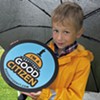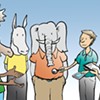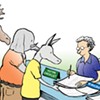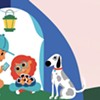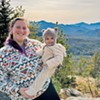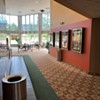Published September 17, 2003 at 4:00 a.m. | Updated November 11, 2015 at 11:39 a.m.
Howard Dean is my friend...ster. We're not exactly friends, really. I mean, we've only met once, and I don't think he got my name. But when I search the Friendster database for everyone in my "personal network" within a 25-mile radius, the ubiquitous presidential candidate's photo and personal profile appear on my computer screen. According to his bio, Howard's interests include "building my grassroots campaign, restoring America's standing in the world, getting back the 2.5 million jobs George W. Bush has lost."
Dean is just one of the 228 people in my personal network who live nearby. I'm connected to all of them through 12 people I've listed on my account as "friends." When my real-life pals add me as their online friend, Friendster.com instantly links me to them, and to all of their other friends, and to all of their friends' friends. I can sort this list by interest or by geography. I can send these people messages through the site, cruise their personal profiles and ask the friends who connected us for an introduction.
Sounds like a dating service, right? Some people do use it that way — you can indicate whether you're looking for a date. But many users are in long-term relationships already, or just aren't interested in going out with people they meet online. Like me, these people connect to Friendster because it's fun. It's like the Six Degrees of Kevin Bacon game, except you're Kevin Bacon. The object is simple: to connect to as many people as possible.
Friendster is also addictive. I admit I'm obsessed with the site. I've been logging on every few hours to watch my friendster total climb like a hot tech stock in the late 1990s. As of this writing, my network consists of 132,500 friendsters. And I've spent hours sifting through the friend possibilities. Right here in Chittenden County I could find Michelle, who likes sarcasm, pirates and shuffle puck, or Noah, who likes denouncing things, misanthropy and "bustin' up old junk."
In a fit of networking mania, I decided to perform an experiment. On Wednesday, September 10, I invited 55 of my local friendsters to participate in a "flash mob" gathering the following night at Muddy Waters coffeeshop in Burlington. I wanted to see if any of these people were actually interested in meeting offline. And I wanted to test how far Friendster has penetrated into our relatively provincial scene. Is Burlington really as hip and wired a town as my friendster network makes it seem? As I waited anxiously for the appointed time, I delved deeper into this grand sociological experiment that's measuring how small our towns, and our world, really are.
Friendster.com debuted just last March and by all measures has become wildly popular. According to a July 17 story in Wired magazine, the database has been growing at a rate of 20 percent a week; it now boasts more than a million users. In an August article on Salon.com, Michelle Cohen, a Web producer from iVillage.com, calls Friendster "the biggest and fastest-spreading street-level social meme in my cyber lifetime." Not surprisingly, it's most popular among the tech-savvy urban hipster crowd, who use terms like "meme" — by which they mean a contagious idea that works its way into the cultural consciousness.
But Friendster.com is more than just a way to meet people and explore a multitude of unlikely connections. It's also a way to advertise your hipness. Users post goofy photos and display carefully calculated interests and tastes. More importantly, users can post testimonials about their friends, which can be very entertaining. "If Lisa were a breed of dog," reads one, "she'd be a hot dog, or a prairie dog, or a shibu inu."
One of my own testimonials, from my friend Roshni, who invited me to Friendster, reads, "Cathy's photo might remind you of Marcy, from the ‘Peanuts' comic strip. Of course, she's actually nothing like Marcy. She's a bad-ass muthafukka in disguise. When she skulks around in the winter, the snow melts in fear." No one has ever said anything so colorful about me before.
Jesse Krembs, the Web guy at Magic Hat brewery, says the testimonials make the site a public reputation system. "They're an online way of saying, ‘What this person says is true,'" explains the 25-year-old Burlingtonian. "It's a vouching system."
I'm connected to Krembs, who uses the pseudonym "Agent X," through my friend Ethan. Krembs responded to my message about meeting at Muddy's, but said he couldn't attend. Instead, we spoke over the phone. Krembs has never used Friendster to meet anyone. He's more interested in the site as a sport. "It's like this weird kind of game," he suggests. Krembs and his friends compete to get "better friendster scores." He's currently connected to more than 200,000.
Brian Cina is also in my network. He emailed to say he couldn't come to Muddy's, either, but he didn't mind answering a few questions. A grad student at UVM who DJs Thursday nights at 135 Pearl, Cina says he got into Friendster through pals in New York. "It's really big there," he says. "People are using ‘friendster' as a verb now, like Googling."
Cina says he's connected to between 200,000 and 300,000 people on his network, though most of them aren't local. "I emailed a few people around here and nobody signed up," he says. "People just totally ignored it, like it was a scourge upon their inbox."
Green Mountain cyber bugs might be slower than their big-city friends to catch on to the trend, but someone has figured out a helpful way to connect them once they do log on. Some enterprising user has created a "Burlington" profile that users can link to as if it were a friend. Burlington's interests include Church Street, great hikes and mountain sports. So far it lists 43 friends, many of whom have posted testimonials.
Here's one from "Alex": "I finally broke up with you and went with another city that also had the coffee and microbrew and dogs and rugged folk and slacker folk that you did, but who didn't keep me up all night with that fratboy "woooooooo!" mating call and who had better ideas for things to do at night and who likes bands that aren't Phish, but you were good for me when I was younger."
Since Burlington is not actually a person, it's known as a "fakester." Fakesters invite people they don't really know to be their friends. Being friends with a fakester is a one-sided affair. Your fakester friend will not write testimonials or vouch for you. Fakesters violate the central principle of a vouching system, which is that everyone in your network knows someone you know, if only vaguely.
Even so, calling Burlington my friend increased my friendster score by 80,000. It was worth it. So much so that I couldn't resist adding "Luke Skywalker" to my friend list. Luke and his rebel friends brought an additional 40,000 people to my network.
But none of my online networking helped bring real live people to Muddy Waters on Thursday night. I arrived early and, afraid people wouldn't recognize me, wrote a sign saying "Friendster?" in black marker. I then sat on the stoop outside, holding my sign, waiting for the mob to arrive. But no one showed up. Not even my real friend Sara, who isn't on Friendster but said she'd come just to see who else was there.
After a while, I started to feel like a beggar with my pathetic sign. A woman who was sitting inside came out to ask what I was doing. As I explained it to her she stared at me with a bemused smile, as if she both pitied me and found me funny. While we were talking, another woman walked past and said, "Friendster is bad. Don't do it!" Shortly thereafter, my new almost-friend walked back into the coffeeshop.
I finally did have an actual conversation with one of my friendsters when, 12 or so minutes later, a group of six smartly dressed, energetic people approached and recognized me. They looked as if they had just beamed down from a much bigger, more stylish, better connected city. They were all from the Dean campaign, and with them was Zephyr Teachout, Dean's director of online organizing and outreach. She's on my friendster network.
"We're here for the flash mob!" the group said. "You're it," I told them. They had been confused by my message and were crestfallen to discover I'd only wanted to meet friends. They didn't care about Friendster; they just wanted to be where the action was. I apologized for luring them from their work with the false promise of a crowd. The group dispersed, though Teachout let me pick her brain for half an hour about the campaign's use of social-networking software.
She told me that my good friendster, Howard Dean, was in fact a fakester. I'd suspected as much, seeing as how I'd stumbled across "Howard Dean" several times while browsing friendster interest lists.
I figured that Dean's Web team had posted the bios, but Teachout says no, it's all "them" — the zealous Deaniacs. Teachout isn't about to squelch this friendster frenzy, bizarre as it may be. Dean's presence on the Friendster site, she says, allows him to become "a hub" for supporters to find each other. The campaign's only Friendster strategy so far has been to stay out of the way. Apparently it's working — their research shows that Friendster directs a large amount of traffic toward the official campaign site.
Teachout is excited about the possibility of social networking sites like Friendster. "It's even better for organizing than it is for dating," she tells me. "With dating, you find someone and you stop looking. When you're organizing, you just keep meeting people."
A couple weeks ago, the campaign launched its own version of Friendster, called Deanlink (www.deanlink.com). It copies Friendster's most addictive elements: Deanlinkers create profiles, post pictures and invite their friends to join. They can then log in to watch the Deanlinker total rise. The site also names the top 10 Deanlinkers, their success defined by the number of people they've attracted to the site.
But Deanlink isn't as spunky or creative as Friendster, and, says, Teachout, that's no accident. Whereas Friendster encourages users to browse profiles online, Deanlink and the other campaign Web tools want users to log off and get together with other supporters in the real world.
Apparently, Friendster users aren't as motivated to meet face to face. A dozen or so Friendster users have emailed me since the Muddy Waters meeting but I suspect that few of them actually use the site for making friends. Brian Cina probably spoke for most Friendster users when he said, "Let's say, for some weird reason, I moved to Idaho and I was alone in Idaho looking for friends. I might use it to meet friends then. But really, I don't have the time to look for new friends."
More By This Author
Speaking of...
-

Howard Dean Won't Run for Vermont Governor
May 20, 2024 -

Jane Kitchel Retiring From the Vermont Senate
May 17, 2024 -

Gov. Phil Scott Announces He'll Run for Reelection
May 11, 2024 -

Dean’s Potential Run for Governor Buoys Dems Eager for a Competitive Race
May 10, 2024 -

Williston Tech Company Polly Lays Off 17 People in Vermont
Dec 5, 2022 - More »
Comments
Comments are closed.
From 2014-2020, Seven Days allowed readers to comment on all stories posted on our website. While we've appreciated the suggestions and insights, right now Seven Days is prioritizing our core mission — producing high-quality, responsible local journalism — over moderating online debates between readers.
To criticize, correct or praise our reporting, please send us a letter to the editor or send us a tip. We’ll check it out and report the results.
Online comments may return when we have better tech tools for managing them. Thanks for reading.

































